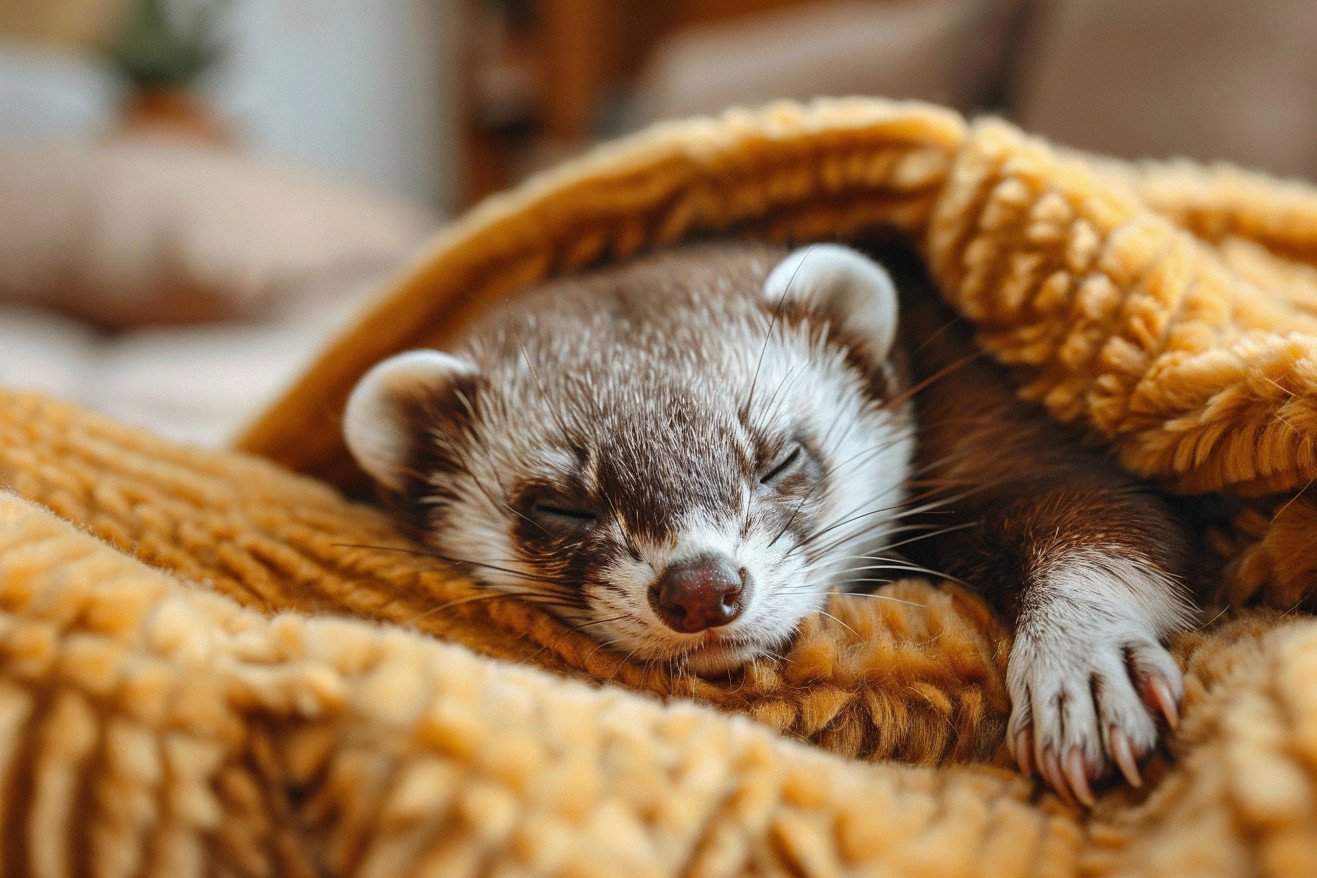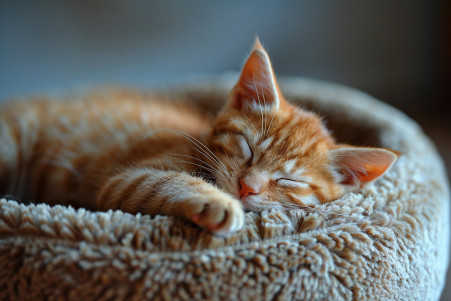Do Ferrets Sleep All Day? A Look at Their Interesting Sleep Habits
16 May 2024 • Updated 15 May 2024

Known for their playful and sometimes sneaky behavior, ferrets' love of the night has led many to wonder if these little guys are really night owls. The answer is no, ferrets are not technically nocturnal animals. Instead, they are crepuscular, meaning they are most active during the hours around dawn and dusk. That said, ferrets can shift their schedules to be more in line with their human families, so if they are being handled and played with in the evening, they may seem more nocturnal.
In this article, we'll explore studies by veterinary and animal behavior researchers to learn more about ferret sleep habits and circadian rhythms. This will help you better understand the biological influences that determine when ferrets are most likely to be awake and active. Knowing this information will help you create the best possible environment for these fun and lovable pets.
Are Ferrets Nocturnal?
Ferret Sleep Needs: Age and Gender Differences
Ferret sleep needs can change dramatically throughout the life cycle, with kits (baby ferrets) sleeping up to 22 hours per day and then gradually increasing their activity levels as they reach adulthood. Meanwhile, senior ferrets tend to decrease their activity levels and increase the amount of time they sleep and rest, often sleeping for the majority of the day and night as they get older.
Gender differences also impact sleep, as male ferrets are often referred to as bigger sleepers than females, which may be due to hormonal and reproductive differences. However, individual ferrets may have slightly different sleep schedules and needs based on their health, activity levels, and personal preferences.
Regardless of age or gender, it's important for ferret owners to carefully observe their pet's sleep patterns and activity levels. Noting any changes in their behavior can help catch any potential problems early and ensure that their needs are being met. Just as studies have shown that ferrets have different sleep patterns, it's important to create an environment that can accommodate their individual needs and rhythms.
How to Make Sure Your Ferret Has a Good Place to Sleep
Ferrets like warm, soft, and dark places to sleep, so you can make sure your pet is comfortable by providing hammocks, tents, or beds lined with fleece or other soft materials. Ferret.com notes that ferret tents will give your pet a place to sleep after a long day of play, while blankets can be used both inside and outside of the ferret's cage.
You can also make sure your pet has plenty of places to sleep by providing multiple sleeping options in their cage or habitat. Friendly Ferret says that hammocks are a great option because they can be hung on every platform to save space, while blankets are also a good option, even if they do tend to get filled with food.
Make sure to clean your pet's bedding regularly and check it for signs of wear and tear or other potential hazards, such as loose threads or small holes that could pose a risk to your pet. The Holistic Ferret Forum warns against materials that can get caught on nails or be swallowed, and instead recommends options like fleece, denim, and other sturdy materials.
You can also help your pet get better sleep by making sure their environment is conducive to rest. This means making sure that the light is low and that there aren't a lot of loud or disruptive noises. This is especially important during the hours when ferrets are most likely to be asleep. By providing a variety of sleeping options and making sure that your pet's environment is clean and quiet, you can help make sure that your pet gets the rest they need.
How to Tell If Your Ferret Is Sleep Deprived and Other Health Concerns
Sleep-deprived ferrets can suffer from a number of health issues, including skin ulcers, weight loss, hypothermia, and a weakened immune system. Per the National Institutes of Health, sleep deprivation in animal studies has been shown to lead to a decrease in white blood cells, which are essential for the body's immune response to infections and diseases.
If a ferret is lethargic, not eating, or experiencing sudden changes in behavior or energy levels, it could be a sign that they are sleep-deprived or that they have an underlying health issue. According to PetMD, lethargy and inappetence are common signs of sleep deprivation in ferrets.
In fact, Ferret World explains that common ferret diseases such as insulinoma, adrenal disease, and heart disease can disrupt a ferret's sleep patterns and lead to symptoms like sleeping too much or not enough. If a ferret is experiencing ongoing sleep disruptions or other symptoms that are worrisome, it's important to get them to a vet, as these may be signs of a more serious health issue.
Paying close attention to a ferret's sleep schedule and overall health can help pet owners catch potential issues early and make sure their pet gets the care they need. By knowing how important it is for these active animals to get quality sleep, ferret owners can make sure their pet's living situation is conducive to their natural sleep patterns.
Shifting Ferret Sleep Schedules
Although ferrets are naturally crepuscular animals, their sleep schedules can be shifted to better match their owner's schedule. The Animal Humane Society notes that ferrets are very adaptable and will change their sleep schedule to match their human's.
By slowly introducing light and activity during the times of day you want your ferret to be awake and making sure their environment is dark and quiet during the times you want them to sleep, you can help them adjust their sleep-wake cycle. VCA Animal Hospitals recommends that ferrets be let out for 2-3 hours of play and exercise each day, and that time can be scheduled to fit the owner's needs. In addition, keeping a consistent schedule for playtime, meals, and sleep can help ensure the new schedule sticks.
With time and effort, ferret owners can help their pets adjust their sleep schedules to better fit their own needs and preferences. This adaptability allows ferret owners to work with their ferret's natural instincts while still making sure their schedules line up.
Light and Seasonal Changes
Ferrets are very sensitive to light and dark and seasonal changes. This is important for their circadian rhythms and overall health. RedCatWeb notes that exposure to natural light and seasonal changes is important for maintaining healthy melatonin production and adrenal function in ferrets.
This means that setting up an environment that allows for natural light and dark can help ferrets maintain healthy sleep patterns and seasonal changes. Ferret World notes that ferrets sleep more when it's cold, when there's more darkness than light, when they're very young, and when they're very old.
In indoor or captive settings, this means that managing artificial light and dark and seasonal changes can help manage ferret sleep and activity. The study cited by RedCatWeb shows that it's important to understand the balance that's maintained in the ferret's natural environment and how artificial light can disrupt this balance, which means that seasonal changes need to be made to their environment.
This shows that understanding the importance of light and seasonal changes can help ferret owners set up an environment that helps their pets maintain their natural sleep patterns and overall health.
Conclusion: Understanding and Accepting Ferrets' Sleep Habits
Ferrets are not known for being creatures of habit when it comes to their activity patterns. One reason for this is that ferrets will adjust their activity levels to their owner's schedule. Also, a ferret that is in good health will sleep for an average of 18 hours a day.
In general, you can't pigeonhole a ferret as strictly nocturnal or diurnal. Instead, they will move between different patterns based on their own needs and their owner's schedule. Whether a ferret is nocturnal, diurnal, or crepuscular (most active at dawn and dusk) is determined by when their owner schedules playtime. Most pet owners will work their ferret's playtime in around their own work and school schedules.
Ferrets have better night vision than humans because they have a tapetum lucidum in their eyes, which reflects light back to the photoreceptors. Although there is no such thing as a "wild ferret", feral ferrets in New Zealand are considered predominantly nocturnal.
Domestic ferrets will generally adjust their activity levels to their owner's schedule, sleeping an average of 18 hours a day. They will move between nocturnal, diurnal, and crepuscular patterns based on when their owner schedules playtime.
With a little patience and attention to their sleep needs, these playful and active animals can live long, happy lives and bring their owners lots of joy.


